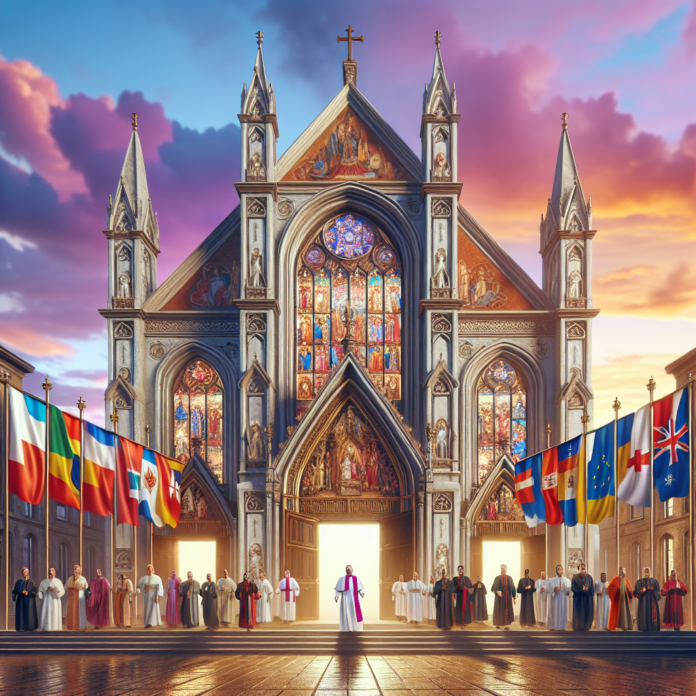Vatican Hosts Historic Synod on Synodality: Exploring Future Pathways for the Catholic Church
Vatican City, October 2023 — The Vatican has embarked on a momentous journey, hosting a historic synod focused on synodality, an ambitious undertaking with the potential to shape the future of the Catholic Church. Involving bishops, clergy, and laypeople from across the world, this synod represents a pivotal moment for the global Catholic community. Its aim is to encourage dialogue, inclusivity, and adaptation within the Church while respecting its rich traditions.
Synodality, at its core, is about fostering a more inclusive and participatory Church. The theme of this synod centers on "Communion, Participation, and Mission," emphasizing the importance of listening and walking together on the path of faith. This gathering underscores Pope Francis’s vision of a Church that actively engages with its members, including those who may feel marginalized or unheard.
A Gathering of Diversity
The assembly brings together approximately 300 participants, including bishops, clergy members, theologians, and lay representatives from diverse backgrounds. The diversity of voices is a critical component, aiming to reflect the global nature of Catholicism. Participants hail from regions spanning Asia, Africa, Europe, the Americas, and Oceania, contributing to a rich tapestry of perspectives and experiences.
This synod also incorporates the insights and opinions of women and young people, whose voices have often been underrepresented in previous synods. By providing a platform for a broader range of perspectives, the synod seeks to address issues pertinent to contemporary Catholic life, such as gender equality, social justice, and the Church’s role in addressing climate change.
A New Path for Engagement
The Synod on Synodality signifies a significant step forward in fostering dialogue within the Church. Pope Francis has repeatedly emphasized the importance of listening as a key component of this process. In his opening address, he encouraged participants to engage in open and honest discussions, free from fear or prejudice. This approach marks a shift from traditional top-down decision-making, promoting a more decentralized and horizontal structure.
At the heart of synodality is the desire to address pressing issues facing the Church and its congregation. Among the topics under discussion are the roles of women in the Church, LGBTQ+ inclusion, the challenges of modern family life, and the Church’s response to technological advancements. By opening these discussions, the synod aims to provide a more compassionate and relevant response to the needs of the faithful.
Reevaluating Tradition and Modernization
Balancing tradition and modernization is a delicate task for any institution with a centuries-old history. In recognizing this, the synod seeks to honor Catholic teachings while exploring new ways to make them resonate with today’s world. Several proposals have emerged, including expanding roles for women in Church leadership and promoting greater involvement of laypeople in decision-making processes.
Moreover, the synod addresses the urgency of addressing climate change, an issue Pope Francis has long championed. The discussions challenge the Church to become an active participant in global ecological initiatives, emphasizing stewardship of the Earth as a moral imperative.
Diverse Voices, Unified Faith
One of the synod’s groundbreaking aspects is the inclusion of different voices within the Church. Archbishop Mark Coleridge of Brisbane described the importance of such diversity: "This is not about creating division; it’s about listening deeply and integrating the diverse experiences and insights our global community offers into a unified faith journey."
Sister Nathalie Becquart, Undersecretary of the Vatican’s Synod of Bishops, highlighted the vital role women play in shaping the Church’s future: "Women’s experiences and insights are invaluable in guiding our collective path. This synod marks a historic step in recognizing and embracing the gifts that women bring to the life of the Church."
The synod also underscores the crucial voices of young people. Youth representatives have been invited to share their visions and concerns, recognizing their role as future leaders within the Church. Their involvement emphasizes the Church’s commitment to understanding and addressing the challenges faced by younger generations.
Potential Challenges and Hope for Progress
While this synod is a momentous step towards progress, it is not without its challenges. The diversity of opinions can sometimes lead to disagreements, particularly on contentious issues. However, these challenges are seen as opportunities for growth and understanding.
Bishop Kevin Farrell, Prefect of the Dicastery for Laity, Family, and Life, reflected on the potential obstacles, stating, "Grappling with differing opinions is essential to genuine dialogue. Embracing these differences allows the Church to grow stronger and more unified in its mission."
The Vatican’s Synod on Synodality represents a historic opportunity for the Catholic Church to embark on a path of renewal and adaptation. By fostering dialogue, inclusivity, and a commitment to addressing contemporary issues, the synod embodies Pope Francis’s vision of a Church that not only listens but also acts in harmony with its values. As participants continue their discussions and deliberations, the world watches, hopeful for a future where the Catholic Church remains a beacon of compassion, unity, and progress.
